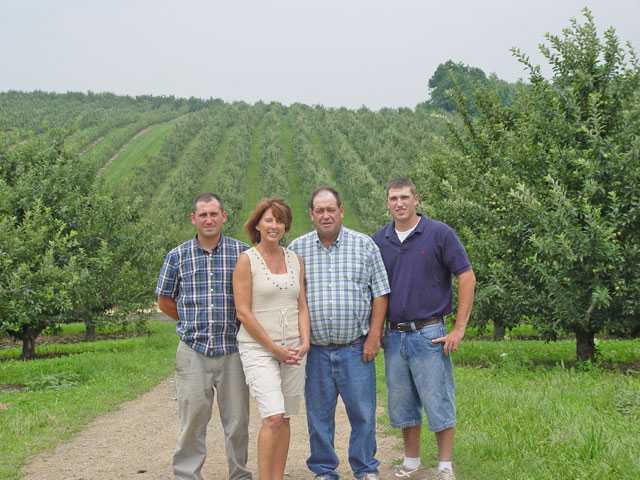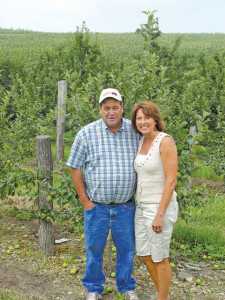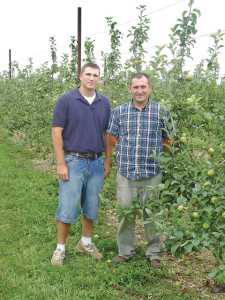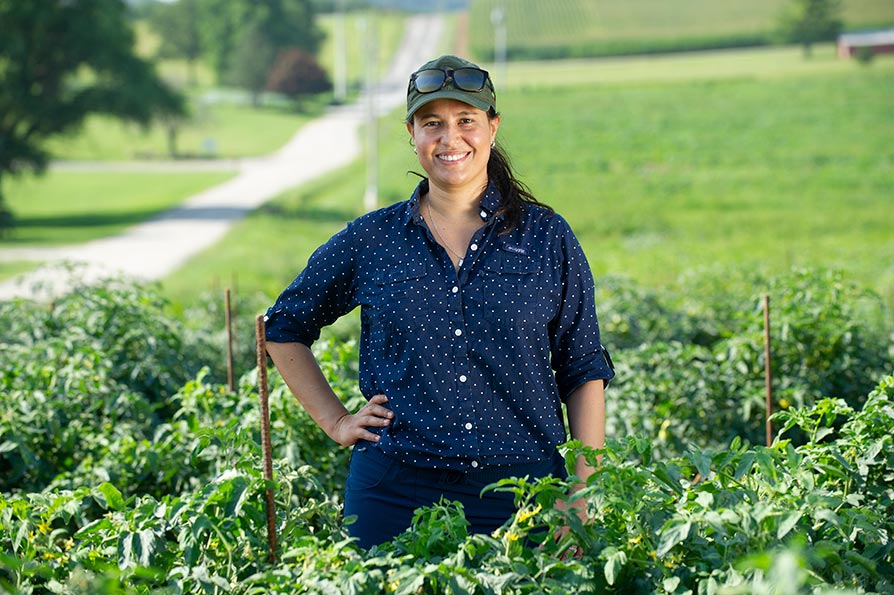Apple Grower Of The Year Finds Success In Hard Work, Integrated Approach

Dan Boyer (third from left), is pictured along with his son Seth, wife Lois, and son Mark. (Photo credit (Brian Sparks)
Dan Boyer’s lifelong work ethic and openness to new ideas have enabled him to operate a successful orchard in central Pennsylvania.
Take a drive through Ridgetop Orchards, look at each block from the bottom up, and you’ll notice a few things right away. For one thing, the tree rows are virtually free of weeds. Look up just a bit, and you’ll see a wide mix of varieties as you pass from one row to another.
Look up a little more, and you’ll notice varying degrees of tree height. Finally, look above the tree in front of you, and you’ll be amazed at the rolling hills and valleys of south-central Pennsylvania.
For owner Dan Boyer, this is the ideal location to grow apples.
However, Boyer knows that it takes more than just the right site to consistently grow high-quality fruit. It also takes good employees, a willingness to accept new ideas and incorporate them into your orchard, and the ability to predict the future direction of the industry, or at least to change along with it. It is
Boyer’s efforts in each of these areas that make him an ideal choice for American and Western Fruit Grower’s 2006 Apple Grower of the Year.
Boyer’s path to success with the 500-plus acre Ridgetop Orchards has not been easy. After graduating from Penn State University with a degree in horticulture in 1976 (see “Turning Out Winners”), Boyer went to work for legendary Pennsylvania grower Don Amick, bringing with him the work ethic instilled in him by his father. He learned a lot about the business of apple growing from Amick, and eventually purchased the orchard from Amick in 1980.
Since then, the orchard has grown from about 120 acres of apples to 400 acres, and tree density has grown to a range of 300 to 600 trees per acre.
Keys To Success
According to Boyer, the No. 1 thing that has helped him build a successful business is the site.
“We have a great site for spring frost, and we cool off in the fall,” says Boyer of the area, which is cooler than the fruit-heavy region of Adams County, PA.
Elevation levels range from 1,300 feet to as high as 1,800 feet, and it is a combination of temperature and good soil that allows Boyer to grow high-quality fruit.
“I’ve been told we get some of the best color in Pennsylvania,” he says.
Of course, the structure you establish for your operation plays an important role as well, and this is another area where Boyer has high standards. Ridgetop grows, packs, and ships only their own fruit, and this vertically integrated approach allows Boyer to see the fruit from beginning to end.
“I know everything we need at every step of the process, versus just growing it and handing it off to someone,” says Boyer.
About 85% of the fruit grown at Ridgetop Orchards is for fresh market, and it is packed right on the property. While Boyer works with a few different brokers for domestic retail chains, he handles all the exporting himself. Last year Ridgetop exported about 50,000 boxes of apples, most of them Red Delicious going to Central American countries.
“It’s hard to sell an Eastern tray-pack Red Delicious domestically, but that’s what they buy from me down there,” says Boyer.

It’s a team effort at Ridgetop Orchards with Dan’s wife Lois handling all of the company’s finances. (Photo credit: Brian Sparks)
At the heart of Ridgetop Orchards, stresses Boyer, is its employees.
“My employees are what keep us going,” says Boyer.
Much of his workforce has been with the company for years, including managers Jim Pepe and Lexie Snyder. However, everything starts with family. Dan’s wife Lois handles all of the company’s finances.
“She lets me know when I’m allowed to spend money,” says Boyer with a chuckle.
In addition, his two sons, Seth (26) and Mark (19) are involved in the business, and are looking for ways to move it forward (see “A Family Legacy”).
Market Analysis
In between running his orchard, attending Penn State football games, and raising beagles on his farm, Boyer will also reflect on the big picture in the apple industry. While admitting that he doesn’t have all the answers — “if I did, I’d be rich” — he does have some interesting thoughts on today’s apple market conditions, and where the industry needs to move in the future.
-
-
- On the Eastern processing market:
“Where we’re headed with low processing prices and a stagnant fresh market is anyone’s guess. Somehow we need to retool our industry. The processors have been great to us, but with the returns we’re getting, people can’t afford to raise processing apples. The figures say that 70% of the apples grown in Pennsylvania are processing, but that will change, not only here, but in places like Virginia as well.” - On labor:
“The labor issue is a Pandora’s box. We as growers can’t live without them. We use local workers and Mexicans, and we’ve been able to come up with enough Mexicans all the time.” - On fuel prices:
“As fuel prices rise, we in the East may benefit due to our proximity to the people. That may be a real plus for us if we have fruit we can get shipped, and do so cheaper than shipping it from the West Coast. But you can’t figure what will happen with $3 a gallon prices for gas. I don’t know where we’re headed.” - On club varieties:
“It might help, but it’s great if you’re in the club and not so great if you’re out of it. Who will decide? It seems like most club varieties are out in the West. There are several big packinghouses, but a lot of independent sales in the East compared to the West. You have to know the right person, and the whole marketing scheme will make us think about things differently.”
- On the Eastern processing market:
-
Trying New Ideas
If there’s one thing Dan Boyer can tell you for certain, it’s that getting involved in industry affairs can lead you in promising new directions.
Locally, he’s a member of the Appalachian Fruit Growers Association, and for many years he served on the board of the State Horticultural Association of Pennsylvania.
With his sons taking a more active role in the business, he’s been able to work outside the orchard even more recently. He’s currently on the Pennsylvania Apple Marketing Board, and, perhaps most notably, he has attended several International Fruit Tree Association (IFTA) events in the past few years, including trips to Italy, China, and Mexico.
Attending these meetings has given Boyer new perspectives on virtually every aspect of fruit growing, from tree density to variety selection.
Following IFTA’s 2004 conference in Bolzano, Italy, Boyer increased his tree density after seeing how well the Italians were able to manage their trees, albeit with a large work force. He also gained a new appreciation for how a tree’s physiology changes as planting density increases. A recent summer tour in Minnesota/Wisconsin also made Boyer even more confident in his ability to grow Honeycrisp, which encompasses about 30 acres at Ridgetop Orchards.
“Everyone said we couldn’t grow it here,” says Boyer.
But with cooler temperatures and higher elevation, he was able to prove them wrong.
“I’ve had people from Michigan and New York look at them and tell me they aren’t any different from other growing areas.”
Boyer is also constantly trying out new techniques for thinning, and readily shares his experience with fellow growers. Most recently he has experimented with a technique of measuring fruit size after the application of a thinner to follow the cessation of fruit growth. The procedure, developed by Duane Greene at the University of Massachusetts, helps predict what percentage of fruit will drop and the effectiveness of the thinning application.
As he looks ahead, Boyer recognizes that change is inevitable, and in order to keep pace in a challenging market, Ridgetop Orchards needs to be constantly moving forward.
“We’ll continue to try to be diverse,” says Boyer.
Which means sticking with Reds but also renewing the orchard with new spacings of varieties such as Gala and Honeycrisp. It’s a difficult process, and requires the ability to look ahead.
“We need to come up with something that consumers don’t even know they want yet,” says Boyer.

Dan Boyer’s sons Mark, 19 (left), and Seth, 26 (right), play an active role in the business. Mark and Seth are also members of the Mid-Atlantic Young Grower Alliance. (Photo credit: Brian Sparks)
A Family Legacy
If there’s one thing Dan Boyer can count on, it’s that Ridgetop Orchards will continue to thrive for many years to come. His sons Seth and Mark each play an active role in the business (Dan also has a daughter, Natalie, who lives in Florida and is in the hospitality industry). Seth, 26, has worked full-time at the farm for three years since graduating from Penn State University (PSU) in 2003. Meanwhile Mark, 19, will be a sophomore this fall at PSU-Altoona, majoring in ag science, and he is spending his summers working at Ridgetop Orchards (Natalie is also a 2004 PSU graduate).
Both Seth and Mark are also members of the Mid-Atlantic Young Grower Alliance, which is working to secure the tree fruit industry’s future while promoting growing as a viable and attractive career to students.
Just recently, Seth returned from a trip to Washington state, which Dan Boyer says was a real eyeopening experience for his son in terms of witnessing the true scale of the industry.
“He thinks we’re headed in the right direction,” says Boyer.
Turning Out Winners
Dan Boyer is not the only Apple Grower of the Year to learn his horticulture trade at Penn State University. The 2004 winner Darrel Oakes of LynOaken Farms in Lyndonville, NY, also earned a horticulture degree at Penn State, three years before Boyer.
In particular, both learned a great deal from horticulturists Loren Tukey and Marshall Ritter.
“I was pretty green when I started,” says Boyer. “But we were molded by Dr. Tukey — a real tribute to that man.”
So for any of you who have sons and daughters enrolled in Penn State’s horticulture program, rest assured they are on the path to success.
At A Glance
Apple Grower of the Year: Dan Boyer, Ridgetop Orchards
Location: Fishertown, PA (Bedford County, west of Adams County)
Acreage: 510 acres; 400 acres of apples, 16 acres peaches, 13 acres cherries
Top Apple Varieties: Red Delicious, Gala, Golden Delicious, Stayman, Honeycrisp, York, McIntosh










